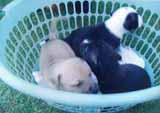Information About PuppiesThe 1st 2 Weeks Of Your Newborn Puppy Litter |
|
|
Did you know that all of your puppy's behavioral patterns will be developed during the first three months of its life? These initial three months are called the "developmental" months. Of course, the first seven weeks or so are the responsibility of the breeder, but beyond that age the responsibility for the dog's socialization belongs to the new owner, which you! During these twelve weeks of development, every four of them are broken up and classified into different periods. The first period being what is called the Neonatal period. This period usually lasts for the first 14 days or so. Keep in mind that not every puppy will experience the exact same time frames of the periods outlined, but they are close. The Neonatal period of a dog's life begins at birth and lasts up to 14 days. At this stage of life the major influence of the pup's life is her mother. The newborn puppy's abilities are very limited to activities like sucking and slowly trying to crawl. Although it may seem like she may hear or see things, the senses of sight and sound are not yet developed. In fact, the eyes will not be able to fully see anything until around 12 to 14 days of age. You may wonder how this little newborn pup learns about his environment at such early age. The answer is through touch. He will crawl around a bit and bump into its mother, while bopping his little limp head back and forth, perhaps bumping also into his litter-mates. During this Neonatal period, there are only three sensations that the puppy is aware of. They are cold, heat, and pain. Because the little pup cannot regulate body heat efficiently, he needs his mother and other members of the same litter to help maintain his warmth for him. You will also find that the puppy will sleep over 90% of the time during these first 2 weeks. It may look lazy, but a lot is happening on the inside to get the puppy ready for the next stages of its development.Back to the Information About Puppies page
| |
|
Related News About Dogs ' ); // get rid of newsfeed display by carp CarpConf('poweredby',''); CarpCacheShow('http://www.netscape.com/tag/puppy/rss'); ?>
|
|
|
|
|
|
Copyright © 2006-2007 dogguidance.com |


